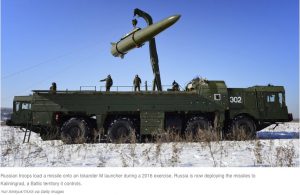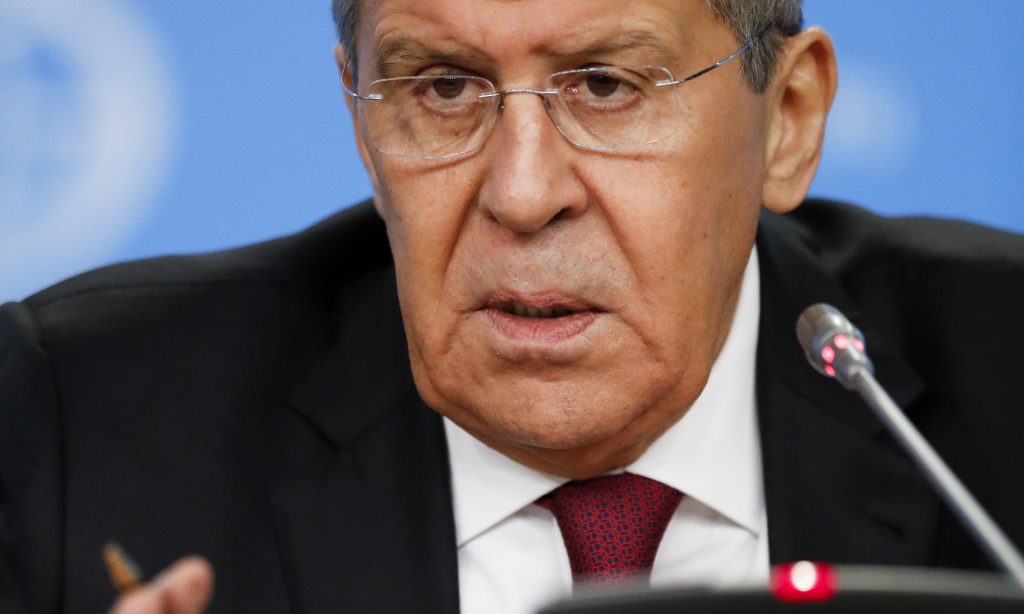Updates
The U.S. And Russia Are Stocking Up On Missiles And Nukes For A Different Kind Of War

NPR, February 1, 2019, 6:07 AM ET By GEOFF BRUMFIEL
The true battle over these new weapons may end up in Congress. While Republicans seem ready to back the Trump administration’s request for more battlefield nukes, the newly elected Democratic majority in the House of Representatives seems intent on blocking them.
“We do not view nuclear weapons as a tool in warfare,” Adam Smith, now the Democratic chair of the House Armed Services Committee, said in a speech in November. “It makes no sense for us to build low-yield nuclear weapons.”
US to Begin INF Treaty Pullout Next Month After Russia Missile Talks Fail
Officials reject Russian offer to inspect new missile; US says it will suspend observance of treaty on 2 February.
By JULIAN BORGER in Washington theguardian.com | Wed 16 Jan 2019 18.29 EST

Photograph: Pavel Golovkin/AP
The US has rejected Moscow’s offer to inspect a new Russian missile suspected of violating a key cold-war era treaty, and warned that it would suspend observance of the treaty on 2 February, giving six-month notice of a complete withdrawal.
The under-secretary of state for arms control and international security, Andrea Thompson, confirmed the US intention to withdraw from the treaty after a meeting with a Russian delegation in Geneva, which both sides described as a failure.
Nuclear arms treaty faces collapse after failed US-Russia talks
By BEN SIMON/ AP channelnewsasia.com
Geneva (AFP) – The survival of a key nuclear arms control treaty was cast further in doubt Tuesday after the US and Russia blamed each other for pushing the agreement to the brink of collapse.
Senior diplomats from both countries met in Geneva amid widespread concern over the fate of the bilateral Intermediate-Range Nuclear Forces Treaty, which successfully put an end to a mini-arms race after it was signed in 1987.
US President Donald Trump said in October that his country would pull out of the deal unless Russia stops violating it. Russian President Vladimir Putin has threatened to develop nuclear missiles banned under the treaty if it is scrapped.
Russia Just Sent Two Nuclear-Capable Bombers to Venezuela
By VLADIMIR ISACHENKOV / AP time.com
(MOSCOW) — Two Russian nuclear-capable strategic bombers arrived in Venezuela on Monday, a deployment that comes amid soaring Russia-U.S. tensions.
Russia’s Defense Ministry said a pair Tu-160 bombers landed at Maiquetia airport outside Caracas on Monday following a 10,000-kilometer (6,200-mile) flight. It didn’t say if the bombers were carrying any weapons and didn’t say how long they will stay in Venezuela.
B2 Nuclear Stealth Bombers Arrive In UK
Russian military: incoming missiles will be shot down if they threaten Russian personnel. Trump: “Get ready Russia, because they will be coming, nice and new and smart!” Read More…
A BBC production, 2016.
Growing Alarm Over Possibility of Nuclear War Between NATO and Russia
Read the recent articles linked below to get a feel for how alarmed some in the know are at this time. These concerns are not heard much on US mass media. You may find some alarmist, but the general drift is unmistakeable. And lets’ not forget that those who know, such as Former Defense Secretary William Perry, have been saying we are not alarmed enough, nowhere near enough. Perry: “The danger of a nuclear catastrophe is greater than during the Cold War. Our public is blissfully unaware.” (ref)
– Foreign Policy: On the Verge of Nuclear War
– Time: Mikhail Gorbachev: The U.S. and Russia Must Stop the Race to Nuclear War
– The Nation: Unproven Allegations Against Trump and Putin Are Risking Nuclear War
– Counterpunch: The Skripal Poisonings and the Ongoing Vilification of Putin
– Salon: Behind this week’s Russia headlines:
A mystery, a leap to conclusions and a fateful turn
How did we get to this point? Here’s some background:
– Andrew Lichterman: U.S.-Russia Nuclear Arms Racing: Still Crazy After All These Years
– Austin Long: Red Glare: The Origin and Implications of Russia’s ‘New’ Nuclear Weapons
The worrisome aspects of Trump’s Nuclear Posture Review represented the arguments of the “Second Nuclear Age” hawks, i.e. that the world is no longer bi-polar, that the US needs more small nukes widely deployed so as not to be caught with either no response or a strategic response in regional conflicts, where the adversary might doubt we would go strategic. Thus US ‘deterrence’ had weakened. In this view, numerous smaller, widely deployed nukes are meant to sustain ‘deterrence’ into the more chaotic “Second Nuclear Age”.
On the other hand, the Russian response is framed by their overriding anxiety that the US, with its missile defense systems surrounding Russia, and NATO troops on Russian borders, is intent on developing the ability to win a nuclear war with Russia. Russia is afraid of the destabilization of the Cold War strategic equilibrium model, wherein neither side sought an advantage so great that it might consider a surprise attack. ABMs – anti-ballistic missile systems- were banned so that neither side could hope to launch a first strike and take out the remaining retaliatory missiles with a missile defense system.
The Russian high command stated last year that they in fact did now think the US was working to develop this capability (ref). The Trump Nuclear Posture Review, with its emphasis on war-fighting nukes, only reinforced Russian command fears that the US could be preparing for a fight. The weapons systems Putin announced last week were all noted for their ability to defeat missile defenses and thus, in the Russian view, to preserve ‘MAD’- mutually assured destruction- the Cold War’s solution to preventing a nuclear war. To understand better the Russian view, it’s worth remembering what Yuri Andropov said in 1981:
“The US is preparing for war but it is not willing to start a war… They strive for military superiority in order to ‘check’ us and then declare ‘checkmate’ against us without starting a war.” (ref)
Putin’s speech to the Federal Assembly March 1, 2018:
“Back in 2001, the US announced its withdrawal from the Anti-Ballistic Missile Treaty. Russia was categorically against this. We saw the Soviet-US ABM Treaty signed in 1972 as the cornerstone of the international security system…
Together with the Strategic Arms Reduction Treaty, the ABM Treaty not only created an atmosphere of trust but also prevented either party from recklessly using nuclear weapons, which would have endangered humankind, because the limited number of ballistic missile defense systems made the potential aggressor vulnerable to a response strike.
We did our best to dissuade the Americans from withdrawing from the treaty. All in vain. The US pulled out of the treaty in 2002…
Despite our numerous protests and pleas, the American machine has been set into motion, the conveyer belt is moving forward. There are new missile defense systems installed in Alaska and California; as a result of NATO’s expansion to the east, two new missile defense areas were created in Western Europe: one has already been created in Romania, while the deployment of the system in Poland is now almost complete…”
Defeating missile defenses, from Putin’s speech to the Federal Assembly, March 1:
– The Sarmat ICBM “is untroubled by even the most advanced missile defense systems.”
– A nuclear-powered, nuclear-capable cruise missile: “invincible against all existing and prospective missile defense and counter-air defense systems.”
– A high-speed, deep ocean nuclear drone “There is simply nothing in the world capable of withstanding them.”
– The RS-26 “Avangard” (aka YU-71) A nuclear-capable hypersonic glide vehicle that can travel at 20 times the speed of sound. “It flies to its target like a meteorite, like a ball of fire”
The intersection of these two contrasting frames of reference could see misunderstandings, confusion, and conflict. Putin seemed to feel obliged to make a clear warning.
“We are greatly concerned by certain provisions of the revised Nuclear Posture Review, which… reduce the threshold for use of nuclear arms… in response to conventional arms attacks and even to a cyber-threat.”
As such, I see it as my duty to announce the following.
Any use of nuclear weapons against Russia or its allies, weapons of short, medium or any range at all, will be considered a nuclear attack on this country. Retaliation will be immediate, with all the attendant consequences.”
But he continued:
“There should be no doubt about this whatsoever. There is no need to create more threats to the world. Instead, let us sit down at the negotiating table and devise together a new and relevant system of international security and sustainable development for human civilization. We have been saying this all along. All these proposals are still valid. Russia is ready for this.
And in closing,
“I hope that everything that was said today would make any potential aggressor think twice, since unfriendly steps against Russia such as deploying missile defenses and bringing NATO infrastructure closer to the Russian border become ineffective in military terms and entail unjustified costs, making them useless for those promoting these initiatives.
It was our duty to inform our partners of what I said here today under the international commitments Russia had subscribed to. When the time comes, foreign and defense ministry experts will have many opportunities to discuss all these matters with them, if of course our partners so desire.”
Stephen Cohen: How Washington Provoked- and Perhaps Lost- a New Nuclear-Arms Race
Quotes and Resources
Dr. Bruce Blair
April 4, 2018:
“Europe has become a nuclear flashpoint where tensions could easily escalate to the level of a nuclear confrontation… Both NATO and Russia are engaging in ‘terrifying nuclear brinkmanship’… that increases the risk of the actual use of nuclear weapons – by design or by accident.”
